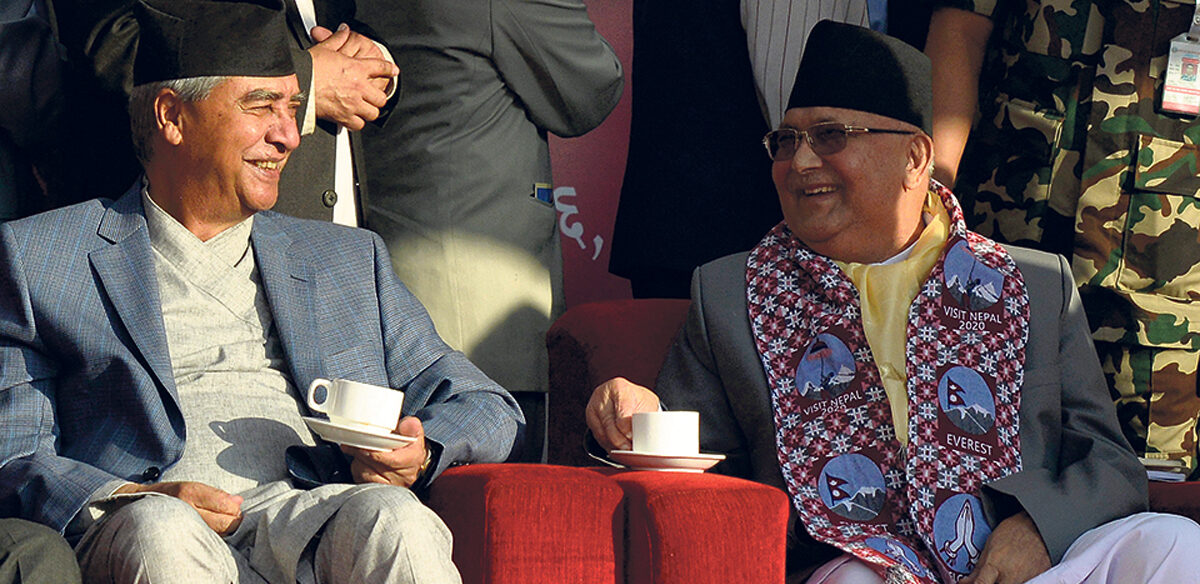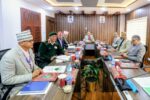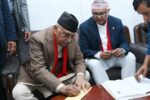KATHMANDU: Two years after CPN-UML Chairman KP Oli began his second term as Prime Minister, Nepal faced its first lockdown due to the COVID-19 pandemic.
Despite the government’s measures to control the virus, infections were rising nationwide.
During this time, Pushpa Kamal Dahal “Prachanda”, one of the two leaders of the ruling coalition, proposed establishing a high-level political mechanism to combat the pandemic.
However, Oli was dismissive of this proposal, believing the government could manage the situation without additional support.
In a video conference with the Chief Ministers of the seven provinces, he stated that a political mechanism was unnecessary, asserting, “The government is sufficient for the prevention and control of COVID-19.”
This rejection of his own party president’s proposal highlighted Oli’s commitment to maintaining governmental supremacy.
However, in a surprising turn, he recently agreed to form a “two-party political mechanism” with the Nepali Congress, contradicting his previous stance.
The first meeting of the task force took place last week, where it was agreed that the parties would alternate leadership of the group monthly.
This new collaboration aims to enhance government efficiency, with the first meeting of the Nepali Congress-UML partnership held on October 31, 2024, under the leadership of both Oli and Congress President Sher Bahadur Deuba.
Former Prime Minister Jhalanath Khanal criticized Oli’s inconsistency, commenting that his earlier refusal to form a mechanism undermines his current readiness to collaborate.
“This shows that Oli’s words lack consistency,” he told Khabarhub, adding, “Sometimes he is right, and sometimes he is wrong.”
Political analyst and senior advocate Prof. Dr. Narsingh Khatri noted that the lack of trust between Oli and Prachanda at the time of the proposal played a significant role in the previous rejection.
Khatri stated that the current political landscape, marked by mutual interests between Congress and UML, has fostered the formation of a new mechanism.
“Now, it appears that both parties have strategies and tactics to make this government stable and successful,” he explained.
The task force of the Oli-Deuba mechanism includes key members from both parties, such as Congress Vice President Purna Bahadur Khadka and senior UML leaders like Ishwor Pokharel and Bishnu Prasad Paudel.
While Khatri acknowledges the ruling parties’ right to establish a political mechanism for governance, he expressed skepticism about public trust in these efforts.
“While they may be able to create a mechanism,” he said, “there is significant public doubt, and faith in their intentions is low.”
Oli and Deuba’s decision to form a “two-party mechanism” will extend across all seven provinces and district levels.
The first meeting of the task force took place last week, where it was agreed that the parties would alternate leadership of the group monthly.
According to this plan, Congress Vice President Purna Bahadur Khadka will coordinate the group’s activities from November 6 to December 5, 2024.
The task force meeting coordinated preparations for the Prime Minister’s official visit to China in December, following an invitation from Chinese Prime Minister Li Qiang.
Khanal further asserted that the Congress-UML alliance, along with the power coalition, is incapable of effecting meaningful change for the country and its people.
The Minister of Foreign Affairs, Dr. Arzu Rana, will oversee these arrangements. Additionally, the task force will facilitate the necessary groundwork for the visit as instructed by Oli and Deuba.
Typically, all preparations for the Prime Minister’s foreign visits are handled by the Ministry of Foreign Affairs.
During such visits, political leaders should provide guidance to the foreign minister, and any task force should assist with the necessary preparations.
However, the constitution does not recognize political mechanisms that directly or indirectly interfere in government operations.
The formation of a two-party system by Nepali Congress and UML appears to contradict the spirit of the constitution.
Article 75(2) of the Constitution states, “The Council of Ministers shall be in charge of the general direction, control, and management of the governance system of Nepal, subject to the Constitution and laws.”
Ishwari Prasad Kandel, head of the Central Department of Political Science at Tribhuvan University, argues that government parties can create political mechanisms for their own convenience.
“Those in the government can establish their own mechanisms and implement robust laws,” he said. “This is not a significant issue.”
Former Prime Minister Jhalanath Khanal, a respected leader of the opposition Unified Socialist, views the Congress-UML two-party system as a sign of mutual distrust.
“If the ruling party forms a mechanism within itself, it reflects a lack of trust among them,” Khanal stated. “Such a mechanism holds no value or significance and does not warrant extensive discussion.”
Khanal further asserted that the Congress-UML alliance, along with the power coalition, is incapable of effecting meaningful change for the country and its people.
“This coalition does not serve the purpose of transformation; rather, it aims to maintain the status quo,” he concluded.









Comment